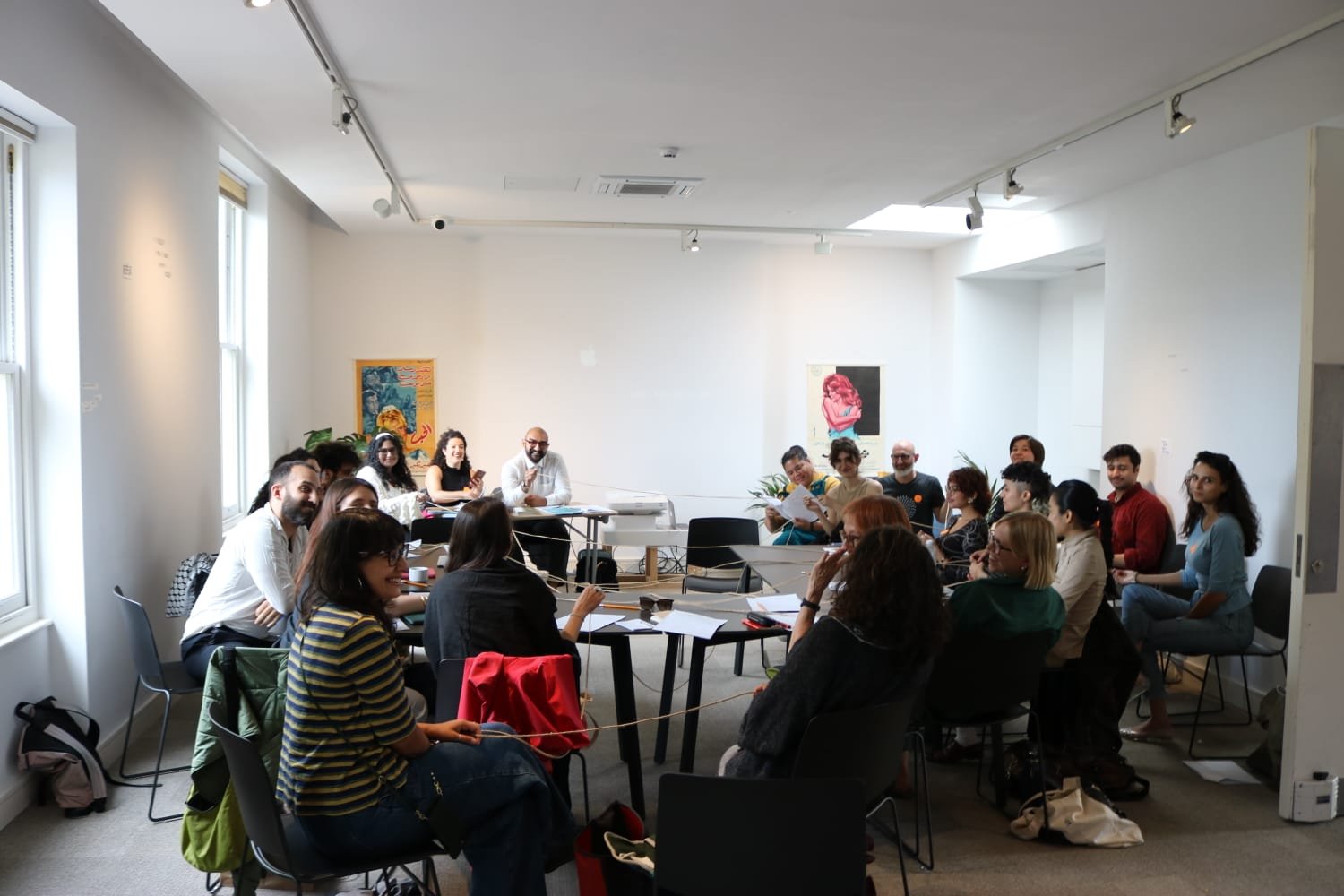Solidarity and Literature
This workshop, sponsored by The Mosaic Rooms and Makan Rights, explored the relationship between an array of literatures and solidarities, resulting in a collectively written poem. This workshop was co-designed and co-facilitated by Luke Williams (Birkbeck College), Rogelio Braga, Sarona Bedwan (Makan), and Azad Ashim Sharma (the87press).
Courtesy of The Mosaic Rooms
they leaned back against a tree and noticed with some delight that there were ripe blackberries amongst the tangle of sharp unruly brambles
each day the crows celebrate morning with their harsh weird chorus of mutual warning i look and try to be more crow
a collective sigh, a shared laugh, a synchronised step, our gaze across a room
having poured herself a coffee she turns on the television and radio to hear the news but all she hears is silence
let go of your fear
i woke up with rage and let it guide me
when i was born i learnt that capitalism won’t save you
in the bleak mid summer a diamond encrusted turtle was crushed by the kings boot
the gaps between us
when i realised that wealth, like poverty, is passed on from one generation to the next
the sound of your voice, the sense of the present, partial nature of yesterday’s message
I’ll fuck up and i’ll fix and repair we are entangled in rage and love
solidarity does not belong to all it belongs to the earth and those who nurture her
sitting by the thames westminster at sunset and thinking of the ganges in calcutta
the tradition of the oppressed is an exercise in pain relief
being held tenderly, unconditional acceptance and the will to continue despite all odds
i cannot start a revolutionary act, i am the act
i drink my tea - never breaking eye contact as i attempt - as i do every morning - to understand why you think i should not exist
the sun rises everyday, i always choose to get up
to me, to you, to the one between us
the valleys will be filled with wheat
standing outside a hospital in Lewisham
i realise I’m part of the world and no one can take me out of it
you, i, them, all of us, neither of us
dance like a skeleton
tradition of necessity - the need to not only be heard but understood - not only understood but allowed to occupy to be powerful to be real
the alternative is stupor
seeing that the blackberries have started to ripen
the curse of seeking for purity
i know freedom is a place
police precincts ablaze in the night
i made a friend who listened, and i listened back
i learned the worst terrors and the greatest victories
at six years old i saw a video of my mum being slammed against a wall, arrested by an israeli soldier
to be seen and recognised, as an individual and as a collective, is the freedom we all seek
this morning i was not woken up by moths
our enemies just crossed the line
that elsewhere is unattainable
Author bios:
Anahí Saravia Herrera is a writer, creative researcher, and publisher-in-training. She is interested in exploring activism and histories of resistance and how we can use creative means to make critical perspectives public. She works at the intersection of community organizing, art making, and cultural work.
Elhum Shakerifar is a BAFTA-nominated producer and curator working through London-based company Hakawati ('storyteller' in Arabic). Her credits include A Syrian Love Story (2015, Sean McAllister), Of Love & Law (2017, Hikaru Toda), ISLAND (2018, Steven Eastwood), Even When I Fall (2017, Sky Neal & Dara McLarnon) and Ayouni (2020, Yasmin Fedda). Elhum was MENA/Iran programme advisor for London Film Festival for 7 years until 2021, and has curated for Shubbak, Barbican, Birds-Eye-View and BFI - most recently Drama & Desire: The Films of Youssef Chahine. She has taught documentary at Berlin Freie and UCL as well as in Georgia, Lebanon, Egypt and Tunisia. Elhum was recipient of a BFI Vision Award in 2016 and was awarded the Women in Film & TV BBC Factual Award in 2017. Elhum is also a poet and translator, most recently PEN Award-winning, Warwick Prize-nominated Negative of a Group Photograph by Azita Ghahreman, translated with Maura Dooley (Bloodaxe Books, 2018). She was one of Writerz & Scribez' inaugural poetry 'Griots'. www.hakawati.co.uk | Twitter: @lalalooms | Instagram: @TheHakawatis
Ishita Uppadhayay is a poet and MSc candidate in Philosophy and Public Policy at the LSE. They have been published in STRAND Magazine and Phi Mag. You can find them on Instagram at @ishitaupp.
Jana Al-Mughrabi is a Syrian filmmaker, producer, and curator who explores radical cinema from the Arab world and the wider Global South, with a particular interest in Women's Cinema and the Female Gaze.
Jonathan Shamir is a journalist and editor.
Kate Arkwright is a writer and researcher from South East London. Currently working as Gallery & Buildings Coordinator at APT Gallery, Deptford.
Penny Woolcock is a writer and filmmaker among other things.
Rida Jawad is an Iraqi writer and teacher. His research interests focus on examining political economy and the role of imperialism in the Arab region, transnational solidarities, and anti-colonial resistance movements in the wider regions of Asia and Africa through militancy, art, film, literature, and cultural production.
Rouzbeh Shadpey is an artist, writer, and musician with a doctorate in medicine and indefatigable fatigue. His work explores (anti)colonial pathophysiologies of illness and weariness, with a focus on the aesthetics and poetics of diagnosis. He lives between Tiohtià:ke / Mooniyang / Montreal and Berlin.
Sanjita Majumder has a PhD. in Visual Cultures from Goldsmiths, University of London, her research investigates the intersections of media technologies, subalternity and reproductive labour with the feminisation of industrial workforces in Southeast Asia.
Shani Cadwallender is a poet, English teacher and part-time PhD student at Birkbeck UoL. Her CHASE-funded creative-critical project, provisionally entitled ‘Trees Revisited’, explores the nature of identity in nineteenth-century arboreal poetry by “minor” women writers. She has been published by Dreich press, Ink, Sweat& Tears, and the87press’ online publication ‘The Hythe’, among others.
Zhanhui (Hui) Jiang has a background in Social Anthropology. Underpinning through ethnographies and ethnographical tools, she has undertaken writing practices that set to re-narrate social events (e.g. non-heterosexuality in Japan and transnational gestational industries) and social concepts (e.g. intimacy and optimism).
While she is particularly interested in Iran and the (un)making of Iranianness, her current writing projects explore, relying on interdisciplinary methods, the non-geographically bounded notions of the Middle East in relation to modernity, sexuality and the intersection between homogeneity and particularity.

